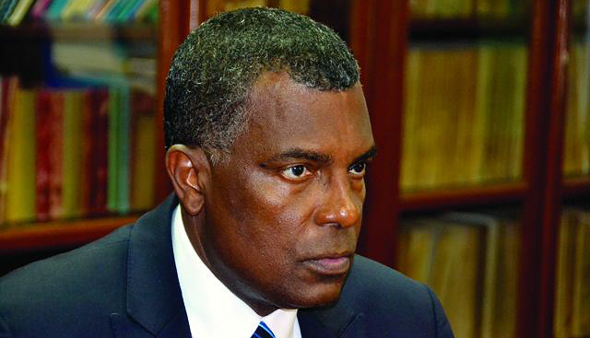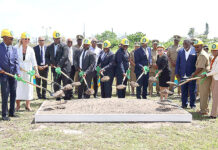
STATEMENT BY SENATOR FRED MITCHELL
OPPOSITION SPOKESMAN ON FOREIGN AFFAIRS
FOR IMMEDIATE RELEASE
11 September 2017
There is a need for a new paradigm in our thinking about public policy throughout the Caribbean including The Bahamas and Bermuda and the states of Florida, Alabama, Mississippi, Louisiana, Texas, Georgia, the Carolinas, Virginia, Maryland, New York, Massachusetts, Delaware, Rhode Island, Maine and Vermont in the United States of America.
In the last three years, The Bahamas has been hit by three hurricanes. Joaquin wrecked the southern islands of the country in 2015, with the Government being responsible for making good the damage in the hundreds of millions. Then there was Matthew last year, another few hundred million, with 150 million directly chargeable on the Treasury. Now we have Irma, and although people are saying that it wasn’t as bad considering, tell that to Morton Salt in Inagua and to the people of Ragged Island, Exuma, Bimini, Andros, Mayaguana, Acklins, Grand Bahama who were traumatised by the event and whose homes were again wrecked by the wind and the flooding.
The flooding although not catastrophic is a portent of things to come.
The Prime Minister of The Bahamas Perry Christie, as he then was, signed on behalf of this country the climate change agreement in Paris in 2016. It made a commitment to the world to try to limit the predicted rise in temperature to below 2 degrees Celsius in order to stop this cycle of rising tides and wild storms. It has not helped the problem in the short term but it is thought that if we all stick to the targets then we have a chance to turn back the tides so to speak.
The last three years should teach us in this Caricom region and in this hemisphere of the Americas that no one country is exempt; and whether or not climate change is the reason, the weather is definitely causing havoc to our way of life. Climate Change as to why it is responsible is irrelevant in the here and now.
The Progressive Liberal Party therefore supports the commitment to the Climate Change Convention. I am here though to argue something further for the consideration of the party and for all nations in this region and hemisphere on this matter. The question that should be front and centre is: how do we adapt to this new weather dynamic?
It seems to me that the answer must lie in what the Dutch are doing in public policy. They have been at it a long time. The Low Lands, or Netherlands as they are called, are below sea level and they have used clever engineering, design and public management to keep themselves from being flooded by water. The British have taken similar measures anticipating the changing weather patterns and rising seas.
Clearly, the Caribbean must do the same. The coastal Atlantic states, the Gulf States of the US, must also do the same. Guyana for example has vast coastal dykes that need repairs. The Bahamas has low lying islands with some 80 per cent of our land mass being below five feet and sea walls need to be repaired, built and reinforced.
Shifting to dealing with adaptation and mitigation policies may be more fruitful, particularly given the apparent aversion of the present US Administration to the Climate Change mantra.
That means the strategy must switch from an argument over what is responsible for the present weather patterns to one more focused on finding the monies to adapt, and to study what is actually happening to us in those weather events, and how we can in the short term protect ourselves from them.
How do we protect ourselves against flooding, and winds higher than 120 miles an hour for which our present building code in The Bahamas has been drafted? This cannot stand when the winds are 185 miles per hour.
What are the insurance solutions? The FNM Government says that they paid the premiums for the Caribbean Insurance and expect that they can get 35 million from it. Good luck to them on that. No nation in CARICOM has received anything substantial from the insurance. The PLP stopped the payments by The Bahamas and decided to self-insure and to work with other CARICOM nations and the World Bank to improve the insurance.
Notwithstanding the arguments over the inefficacy of the present insurance, insurance is a part of the solution. My argument is that we should have a new corporation for flood and wind damage insurance like the Deposit Insurance Corporation for the deposits in Bahamian banks. By doing this, we will privatize the response to hurricanes by allowing individuals to rebuild themselves, instead of these omnibus Government solutions of fixing homes and buildings after a weather event. The reconstruction efforts are often woefully inefficient in their outcomes.
This will need legislation of course.
Taxes will also be part of the solution. Public infrastructure will require the Government to pay. Although then Prime Minister Perry Christie was trashed because of the unartful way the matter was expressed, it is clear that a special levy will have to be considered if the Government is to find emergency money every year to pay for fixing hurricane damage and damage from other weather events. Let us not forget the Cat Island floods of 2006 or those in San Souci in New Providence in the same decade.
Then there is the infrastructure. The Smith Point Sea Wall in Grand Bahama is the instant example of the problem. Money is always an issue. Capacity of contractors is another. We therefore have to spend time in training contractors among other infrastructure works considerations. We have to spend time improving the approval procedures of the Ministry of Finance, the Ministry of Works and its engineers and architects and the procedures in other government agencies.
We also have to spend time educating the public on how to respond to the weather phenomena, and improve our central communication and transportation responses. For example, the videos from the tornadoes in Grand Bahama showed people running toward them, instead of taking cover. All these responses proved less than adequate during this last storm.
The now Prime Minster for example attempted to fly to the southern Bahamas with his Cabinet and the Leader of the Opposition on 10 September when it was clearly unsafe to do so. The air equipment and the way the Prime Minister travels around does not seem adequate, fit for the purpose, nor safe. It is unwise in any event for the entire Cabinet of The Bahamas to be flying on the same plane together. All of that has to change.
The United States, France, The Netherlands, Canada and Britain are the big boys in the neighbourhood but none of them appear to have been prepared, or the particular island governments, for the looting and disorder that took place that required immediate measures to protect life, limb and property.
We saw that in BVI and in St Martin.
I think that this then is the time for all the CARICOM leaders to come together to attempt the design of a new paradigm which accepts the new reality. The weather is gonna be bad for years to come. The US, Canada, Britain, France and The Netherlands must join in.
The central question will be: how to raise the money to defend ourselves? It is existentially urgent.
It may also mean that we have to come to an agreement with the United States or Latin Countries about temporarily moving our populations to those countries if an actual dire situation occurs.
It will also mean that troops from all countries will have to be on stand-by to help maintain order at a moment’s notice. Special training for this duty will be required. Caricom already has some capacity under the existing regional Caricom security arrangements. These present Caricom arrangements may be formalized with other countries. For example, Patrick Manning, Prime Minister of Trinidad and Tobago, did so when Hurricane Ivan hit Grenada. Prime Minister Manning sent troops to Grenada to help the Government of Grenada maintain order and for search and rescue.
The FNM came to power criticizing the foreign travel of the Foreign Minister of the PLP; that was me. They thought that the Prime Minister should not have travelled either. Of course, they are busy doing the same, now recognising that it cannot be done from sitting at home alone. We now see what Perry Christie was talking about when he said The Bahamas cannot get discretionary money that is at concessionary interest rates, to fix the hurricane damage because of this pernicious measure of GDP per capita.
If as I suspect the damage of Hurricane Irma is going to require extra budgetary resources, the country will have to go to the market again for the third time in a row. There goes Peter Turnquest and his budget balancing. He may be faced with the same thing that the PLP faced in 2016 with Hurricane Matthew. Whether he faces that circumstance is not a political matter, it is a matter of the needs of the country. During Hurricane Matthew, the country was shut down for four days. One hundred million dollars in revenue were lost; 150 million dollars had to be borrowed. The costs of this Hurricane Irma are not yet in but I will bet the issues will be similar.
The PLP is pledged to work with all Governments including our own on this new paradigm.
We need to do something different going forward, rather than a simple prayer “Lord help us!” Faith without works is nothing.
-end-







